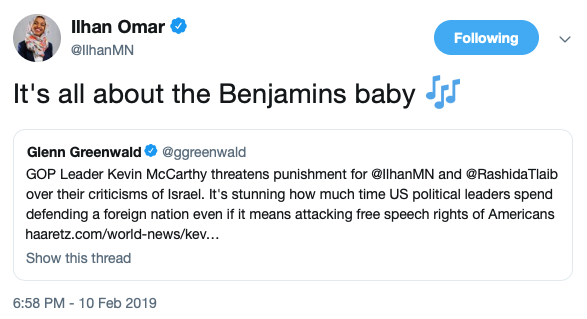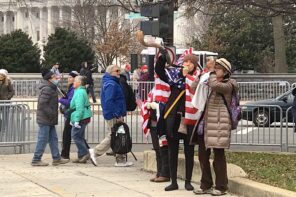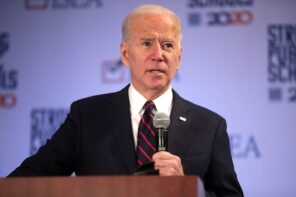There have been and will be many important conversations about Minnesota Congresswoman Ilhan Omar’s recent, and disappointing, series of tweets about American foreign policy, American Jews, and Israel. But what’s missing so far is any consideration of why the question of Israel, and the plight of Palestinians, is so central to so many Muslims’ identities.
While Israel/Palestine isn’t exclusively a conflict between Jews and Muslims—a significant percentage of Palestinians are Christians, and the Holy Land is holy to Christians too, of course—that dispute nevertheless implicates many Jews and Muslims. Some of that is political, some is historical, and some is theological. All of it is important. It doesn’t sufficiently explain American support for Israel, nor does it adequately explain wherefrom Ilhan Omar’s concerns arise, but it is all the same essential to any understanding.
For many supporters of Israel, the establishment of that country was a return home, the reunion of a people long exiled with the land in which they were formed, the backdrop to and setting for their most sacred history. Zionism was the dream of Jewish sovereignty restored and returned; thus, many Jews feel attacks on Israel challenge core elements of an ethnic, national and religious identity.
Many Muslims (among others) see this history differently.
Much has been written about whether anti-Zionism, or criticism of Israel more generally, is anti-Semitic; as recent instances have demonstrated, sometimes criticism of the Jewish state becomes mired in anti-Jewish bigotry, or is itself a cover for that ancient hatred. But there is simultaneously an Islamophobia embedded in the history and expression of political Zionism, which hardly ever gets mentioned.
To many Muslims, the only reason Zionists believed they had a superior right to part of the land was because its indigenous inhabitants had an inferior right to it. Because they themselveswere inferior. That sentiment wasn’t perceived to be particular to Israel’s founders, it was a part of a larger, longer, and historically undeniable pattern of Western usurpation, with which Israel was associated.
Indeed, when the British government decided to create for the Jews a national home in mandatory Palestine, it did so without considering the rights of the land’s actual inhabitants. When the United Nations voted to partition mandatory Palestine, it did so without consulting her indigenous people, who were rightly astonished and infuriated that their land should be taken from them by force.
How are we to reconcile these narratives?
There’s also the matter of Muslim sacred history. If we’re going to consider the sacred history of Jews, it only makes sense to do the same for Muslims.
In Islam, ever since Adam and Eve, God has chosen to speak to select human beings, to remind the species of certain key truths: that God is One, that life is short, that there is death, and then judgment, and then life everlasting. These truths are called Islam, and they were vouchsafed to, among others, Abraham and Ishmael, Isaac and Jacob, Moses, David, Solomon, Jesus—and Muhammad.
All of them preached Islam, which means all of them were some kind of Muslim, which means that Jerusalem isn’t just sacred to Muslims because of Muhammad’s connection to the land, but because of the connection of ancient Muslim peoples and their religious legacies. We believe, in other words, that the Children of Israel were Muslims.
This doesn’t mean an ex post facto claim on their religious identities. It could be just as easily taken by Muslims—and it is—that Muhammad’s religion was not a new religion, that he was not the founder of a distinct spiritual tradition, but merely continuing and concluding a chain of like-minded Prophets. That is, of course, not how many Jewish people would see their own sacred history—as the apparent property of someone else’s religious tradition; what some Muslims might see as a laudable ecumenicism they might see as an aggrandizing cooptation.
How are we to reconcile these narratives?
And when the Prophet Muhammad lost his beloved wife, Khadija, in the face of unrelenting hostility from his Meccan opponents, shortly after he’d gone public with his preaching, God consoled him with what Muslims celebrate as al-isra wa’l mi’raj, the night journey and the ascension. Miraculously he was carried to Jerusalem, to the Temple Mount itself, and therefrom to congress with the Divine.
Thus the heart and soul of the Old City, the greatest elevation of this great city, what was once the First and Second Temples, is the home of the Dome of the Rock and the Farthest Mosque, al-Aqsa. In any conversation about peace between Israelis and Palestinians, and access to sacred spaces for Jews, Christians and Muslims, this contentiousness cannot be ignored.
How are we to reconcile these narratives?
First and foremost, not by tweeting. A conflict so contentious cannot be decided by quoting song lyrics, nor should we imagine that so. Nor can we simply dismiss beliefs because we see them as merely myth and legend; to believe we can act as if people do not have their convictions is as fanciful as those convictions appear to nonbelievers themselves.
We can do so first by listening. Carefully and closely. Muslims should do more to understand anti-Semitism, and especially how criticisms of Israel, or Jews, sometimes do shade into outright bigotry. But this exercise in understanding does not mean accepting the argument that, just because one finds a policy or critique offensive, that it is therefore prejudicial.
Take BDS, for example. Is BDS anti-Semitic because it focuses on Israel? There must be legitimate mechanisms of resistance to occupation and dispossession, given the clear imbalance in resources between supporters of Israel and advocates of Palestinian rights, never mind between the Israelis and Palestinians themselves.
We can do so, second, by reimagining. I hope Rep. Omar is able to move forward after this unfortunate, second charge of anti-Semitism; to do less social media and more of what she was elected to do: legislate. Because that’s what we need to hear from her. Less of what she’s against. More of what she’s for. Is there anyone better placed to do this?
The two-state solution is dead; Netanyahu and Trump want it so, the Palestinians know this, and yet, in our national conversation, we still absurdly pretend as if that ship hasn’t sunk. But what’s to come next? Increasingly many people believe—this author included—that a single confederation of two peoples, enjoying significant autonomy but sharing certain executive and legislative functions, is the solution that best allows for collective peace, dignity, and self-expression.
I don’t know if this is what Congresswoman Omar believes, but I would love to know what she believes. I’d love to hear what she thinks a way forward is. I believe she and other new members of the most diverse Congress in U.S. history are ideally placed to bring fresh air to stale conversations. I would love for them to do what Alexandria Ocasio-Cortes did in promoting a Green New Deal, and outline a New Deal for Palestine and Israel.
To ask the hard questions, to continue the conversation we are beginning to have, to think outside the box.
What should a progressive foreign policy look like? When we say we should ally with countries that share our values, what values, exactly, are we talking about? Whom do those values apply to? How can we make up for years of support for policies and actions that discriminated against and harmed Palestinians without abandoning our ties to Israel? What are the reasons for our support for these policies?
How will we reconcile these different narratives?
The Jewish-Muslim conversation may be the greatest interfaith challenge of our time, and for many Jews and Muslims, Israel and Palestine are the greatest stumbling blocks. We have to learn how to get this right. To learn how to diverge from one another without demonizing one another, no matter how strong the temptation. We owe it to ourselves, to our country, and to posterity, to get it right.
As the American Muslim community rises, culturally, socially and politically, we will have to consider our domestic and foreign policy priorities, on what terms and in which language we discuss these, or, instead, a simpler question, which says less and contains more: What will we lobby for?




